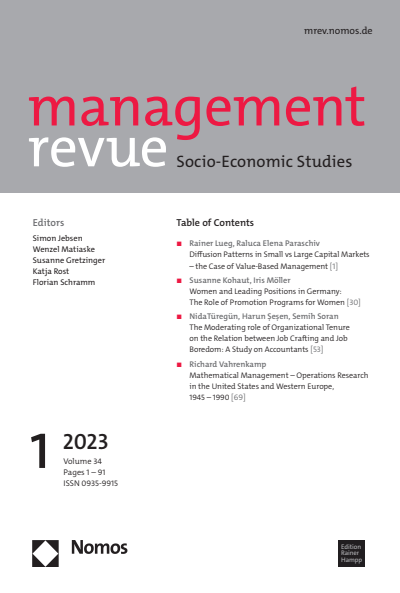Corporate Responsibility: In the Dilemma between Fake and Trust?
IF 1.7
0 MANAGEMENT
引用次数: 1
Abstract
The accusation of whitewashing accompanied the discussion about corporate social responsibility (CSR) since its inception the 1950s. That's not surprising. Ever since its beginnings in Scottish moral philosophy, economics did not expect the general good to be enhanced by the individual's social orientation, but rather by its self-interest, a concept less liable to disappointment, and the work of the invisible hand (Hirschman, 1977). The latter aims to promote a common goal that individuals have not intended. Following his famous text, Adam Smith (2007 [1786], p. 350) continues: ‘I have never known much good done by those who affected to trade for the public good.’ The ‘mistrust’ of the ‘goodwill’ of the capitalist lives on in various streams such as Marxism, (neo-)liberalism or sociological system theory, to name but a few schools of thought. Marxists do not expect societal progress any more than (neo-)liberals from benevolent capitalists who, demand more taxable profits, instead of social responsibility, in the framework of the market organization of companies. System theorists find that ethical demands are hardly transferable directly into the economy code of payment/non-payment. Although Adam Smith (2007 [1786], p. 350) shared the view that the claim of public good orientation is ‘indeed, not very common among merchants’, but that ‘very few words need to be employed in dissuading them from it.’企业责任:虚假与信任的两难抉择?
对“洗白”的指责自上世纪50年代企业社会责任(CSR)诞生以来就一直伴随着它的讨论。这并不奇怪。自苏格兰道德哲学开始以来,经济学并不指望通过个人的社会取向来提高总体利益,而是通过其自身利益来提高总体利益,这是一个不易令人失望的概念,也是看不见的手的作用(赫希曼,1977)。后者的目的是促进一个共同的目标,个人并没有打算。亚当·斯密(Adam Smith, 2007[1786],第350页)在他的著名著作之后继续写道:“我从未听说过那些假装为公众利益而进行贸易的人做了多少好事。对资本主义“善意”的“不信任”存在于各种流派中,如马克思主义、(新)自由主义或社会学系统理论,仅举几家思想流派的例子。马克思主义者并不比仁慈的资本家(新)自由主义者更期待社会进步,后者在公司的市场组织框架内要求更多的应税利润,而不是社会责任。系统理论家发现,道德要求很难直接转化为支付/不支付的经济准则。虽然亚当·斯密(2007[1786],第350页)也认为,公共利益导向的主张“确实,在商人中并不常见”,但“很少需要用言语来劝阻他们”。
本文章由计算机程序翻译,如有差异,请以英文原文为准。
求助全文
约1分钟内获得全文
求助全文
来源期刊

Management Revue
MANAGEMENT-
CiteScore
1.20
自引率
0.00%
发文量
7
期刊介绍:
Management Revue - Socio-Economic Studies is an interdisciplinary European journal that undergoes peer review. It publishes qualitative and quantitative work, along with purely theoretical papers, contributing to the study of management, organization, and industrial relations. The journal welcomes contributions from various disciplines, including business and public administration, organizational behavior, economics, sociology, and psychology. Regular features include reviews of books relevant to management and organization studies.
Special issues provide a unique perspective on specific research fields. Organized by selected guest editors, each special issue includes at least two overview articles from leaders in the field, along with at least three new empirical papers and up to ten book reviews related to the topic.
The journal aims to offer in-depth insights into selected research topics, presenting potentially controversial perspectives, new theoretical insights, valuable empirical analysis, and brief reviews of key publications. Its objective is to establish Management Revue - Socio-Economic Studies as a top-quality symposium journal for the international academic community.
 求助内容:
求助内容: 应助结果提醒方式:
应助结果提醒方式:


